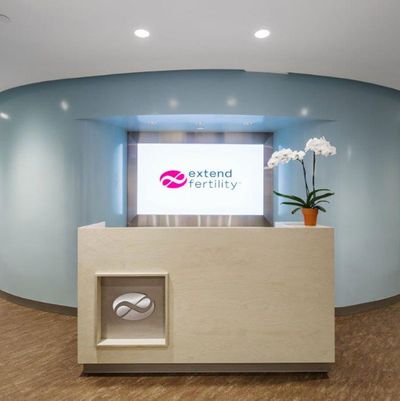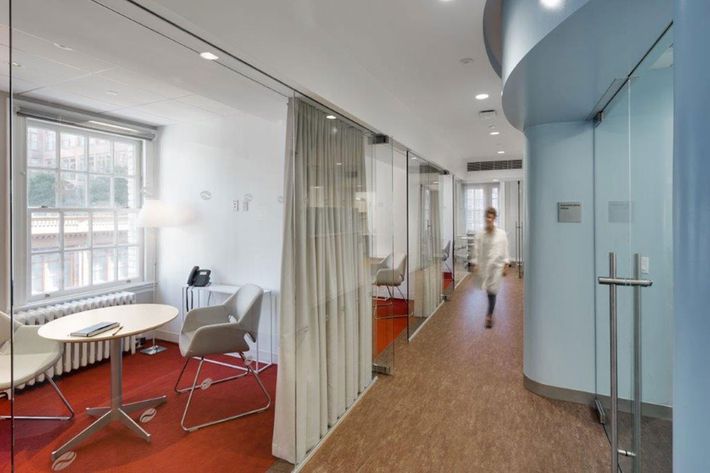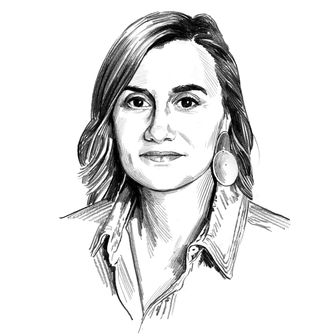
When Jo Dhesi froze her eggs in early February she chose to avoid the typical fertility clinic. Instead, the newly single 29-year-old opted for a “boutique clinic” in midtown Manhattan called Extend Fertility, one of a growing number of medical companies that cater specifically to millennials and market the procedure as a way for women to take control over their lives. Dhesi considered freezing her eggs as a way to buy herself peace of mind. She felt empowered by her choice and didn’t want to be in a clinic designed for women who are, as she put it, “you know, having issues starting a family.”
Extend’s atmosphere offered something different. “Everyone is so nice,” says Dhesi. “[It’s] just this bubbly good thing because everyone is doing something proactive for themselves.”
The foyer of Extend Fertility’s egg-freezing clinic is the anti-waiting room. The space has soothing pale-blue walls, pots lights, and six large dark-blue upholstered chairs more suited to a hotel lobby than a medical center. There are no fluorescent bulbs and no copies of Reader’s Digest. Unlike most sterile medical offices, the atmosphere evokes wellness rather than illness.
Extend, like Prelude Fertility and Progyny, is part of a new crop of start-ups marketing egg freezing to women under 35 and capitalizing on a very real biological conundrum: As more aspiring mothers delay childbirth to climb the career ladder or find the right partner, their fertility starts to wane in their 30s. In lieu of the typical medical experience, however, these companies offer sleek décors and top-notch customer service to help brand the procedure as a proactive choice. Just like Uber, Seamless, Spotify, and Tinder, they cater to the millennial desire for infinite options and a user experience that’s more stylish and efficient than the traditional clinic.
Lisa Besserman, a 32-year-old tech startup founder who is considering freezing her eggs to focus on her career, says the idea of a millennial-focused “boutique” is more appealing than a clinic. She’s “on the fence” about whether she wants to be a mom, but knows for sure that she wants to preserve her options. “I would feel very bad to be in the same room as a woman trying desperately to get pregnant,” says Besserman, who splits her time between Buenos Aires and New York. “In a sense I would feel selfish to say, ‘I have the ability [to have kids], but I’m putting that on hold’ … that would really take a toll on me psychologically.” Right now, the only thing that distinguishes Besserman from the women she doesn’t want to upset is time. If and when she wants to use her eggs, she will have to undergo the same often nerve-racking experience many women struggling with infertility turn to: in vitro fertilization. But clinics like Extend allow their clients to temporarily suspend that reality.

Up until a few years ago, egg freezing wasn’t recommended for most women. The procedure was primarily offered to women undergoing cancer treatments and by clinics specializing in infertility. Success rates were low because eggs were frozen so slowly that ice would often form and damage the cells. But in 2012 the freezing technology had advanced enough that the American Society for Reproductive Medicine (ASRM) announced the procedure was no longer “experimental.” Since then, it’s become more popular and doctors have begun recommending it to healthy, young women.
Despite its increasing popularity, egg freezing still has low rates of success. According to the ASRM there’s a 2 to 12 percent chance that any single frozen egg will result in a baby — most fertility clinics will retrieve a minimum of one dozen eggs so that women have at least a 24 percent chance of motherhood. The available data is imperfect because it includes eggs frozen with both the old and new methods, but most medical studies put the success rate between 25 and 50 percent.
In the last few years, “elective freezing” has become more popular among millennials. Tech companies such as Facebook and Apple now cover the procedure’s cost and by 2018, the Society for Assisted Reproductive Technology (SART) estimates that 76,000 women will freeze their eggs — more than 15 times the rate in 2013. Those numbers mean big business for medical companies that market prolonged fertility as freedom.
And marketing for Extend, Prelude, and Progyny is critical to their message: Their websites feature animated fertility fact videos set to upbeat music and photos of smiling young women under chatty captions like “Best gift to self. Ever.” and “Hit the snooze button on your biological clock.” Progyny hosts educational cocktail parties about the procedure in major cities, and Prelude Fertility hired Allison Johnson, Apple’s former marketing chief, to do its advertising. In six months, Prelude will open a new floor in its existing Atlanta clinic with couches and non-fluorescent lighting that, according to CEO Martin Varsavsky, will “feel more like a café” than a medical facility.
“It’s sort of like we are customizing the experience for young working women who want to get in and out,” says the serial entrepreneur who raised over $200 million for his fertility start-up. “These are not women who are traumatized because they can’t have a child.”
The companies also cater to young women’s budgets. Extend Fertility offers egg freezing for under $5,000 — which, while not cheap, is less than half of what women pay at regular fertility clinics (fine print: Hormones and storage not included). However, once clients want to use their eggs, Extend patients will also have to pay at least another $12,000 for IVF. Prelude offers a subscription-based pricing model that starts at $199/month for egg freezing (and sperm freezing for couples) over the course of four years, with a down payment that ranges from $3,000 to $10,000 depending on whether the woman wants to pay upfront IVF. Extend, which opened last August but only became fully operational in January with the addition of a lab, has served 500 patients, but declined to say how many have had the procedure.
The start-up approach to egg freezing includes a “patient journey” that differs from a regular trip to the doctor’s office. At Extend Fertility the “consultation rooms” that overlook Carnegie Hall resemble the huddle spaces at tech start-ups, with their red carpets, white floor lamps, and white upholstered chairs that would look at home in any CB2 catalogue. The company’s CEO refers to the spaces as “little living rooms.”
Joshua Klein, the chief medical officer at Extend Fertility, says the typical style of infertility clinics can be alienating to younger clients. “There are pictures of babies and success stories and [they are] filled with couples,” he says. “Our office has been created to feel like a health and wellness kind of environment for typically young and single women.”
The staff at Extend was trained in “enlightened hospitality” by the famed restaurateur Danny Meyer’s consulting company. It’s the kind of place that offers prospective patients a free phone call with a “fertility adviser,” remembers if you’re going through a breakup or have a birthday coming up, and fixes customer-service hiccups with bottles of Champagne. They also meet with patients in the early morning, evenings, or weekends to accommodate busy work schedules and communicate over email (or text).“You feel like you’re not just somebody on a list,” says Dhesi. “You go there for two weeks and feel like you’re part of this family.”
While free bubbles might beat waiting over an hour for a 15-minute appointment, some experts think egg freezing should be marketed as a medical procedure, not a lifestyle choice. “[These companies] are selling you this carefree imagery and the idea that [egg freezing] is a piece of cake,” says Marcy Darnovsky, the executive director at the Center for Genetics and Society (CGS). “It’s far from a piece of a cake or a walk in the park to get eggs retrieved.”
While egg freezing has been around for 30 years, it’s no spa treatment. The 8- to 12-day process requires daily injections of ovary-stimulating hormones, regular vaginal ultrasounds, and, finally, the insertion of a needle through the vaginal wall to extract the eggs.
The main side effect is ovarian hyperstimulation syndrome (OHSS), which in its mildest form can include symptoms such as nausea, vomiting, bloating, and abdominal pain, and, in more severe cases, can lead to internal bleeding and kidney failure. Extreme OHSS only happens one percent of the time, but in a few instances has resulted in death.
When the ASRM removed the “experimental” label from egg freezing back in 2012, its research contained the important caveat that there was “not yet sufficient data” to recommend egg freezing to healthy women who simply want to delay childbirth. Darnovsky says there is still a lack of long-term studies on the effects of the procedure on mothers and their babies, but that companies are clearly more concerned with targeting “a whole new consumer base” than being medically cautious. “You’re putting your eggs into basically a type of anti-freeze,” she says. “What do we know about the absorption of those chemicals and subsequent development?”
At Extend Fertility, Klein says he is completely transparent with his patients about the limits of available data and presents them with the most up-to-date research. “If we give people information and they make an informed choice that’s [not] a bad thing,” he says. “I’m very comfortable with the idea that that’s what we’re doing every day.”
Besserman, the 32-year-old entrepreneur, will likely get her eggs frozen in Buenos Aires where the procedure costs less. But if she didn’t spend half her year in Argentina, she says Extend would be her top choice because the staff is trained to handle women in her situation. “It’s not just easy to say ‘freeze my eggs’ like it’s some other procedure, like getting lip fillers,” she says. “It’s something you have to think long and hard about.”
Dhesi decided to go through with the procedure after thinking about it for less than a week and says she has no regrets. The day after her eggs were frozen she felt “a little bloated” but described the side effects as “nothing crazy.” Though she hates needles, the ones she used to inject her stomach with hormones were so tiny they didn’t bother her. In fact, she feels so relieved to have her eggs on ice that she’s already convinced a few single friends to sign up for the process.
“So many things that we buy are so meaningless … [but] this is something that is going to provide me a lot more internal happiness than a purse would” she says. “I always joke that if I do end up having kids from this, I can be like, ‘You know, I could have bought a Chanel bag but I decided to freeze you instead.’”





